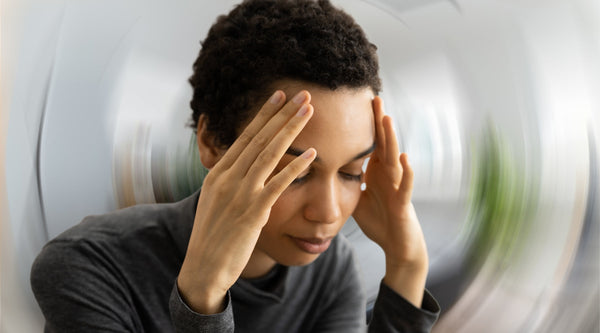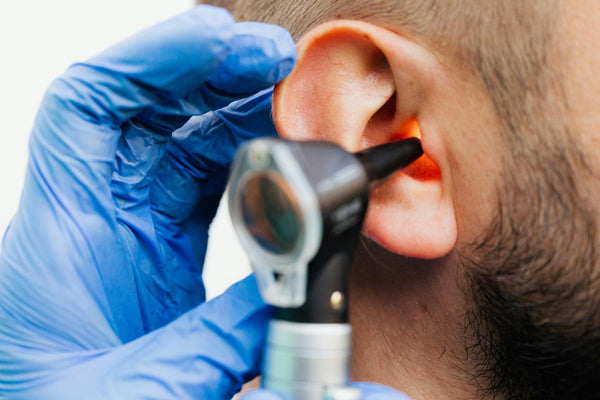Vertigo: causes, symptoms and how to find relief
Feeling dizzy or as though the room is spinning can be unsettling. This sensation, known as vertigo, often comes from a problem in the inner ear, which helps control balance. While vertigo can feel alarming, it’s usually treatable and often linked to conditions that are temporary or easily managed.
At Leightons, our audiologists are here to help you understand what’s behind your dizziness and guide you toward the right care, offering safe and professional support for your ear and balance health.
What Is vertigo?
Vertigo isn’t a condition itself, but a symptom - a feeling that you or your surroundings are moving when they’re not. It’s usually caused by an issue in the vestibular system, the part of your inner ear responsible for balance.
Some people describe vertigo as feeling like spinning, swaying, or tilting. It can last a few seconds or persist for longer periods, depending on the cause.
What causes vertigo?
Vertigo can occur for several reasons, many of which are related to the inner ear. Common causes include:
Benign paroxysmal positional vertigo (BPPV): The most common cause of vertigo, where small crystals in the inner ear move out of place and trigger dizziness during head movements.
Inner ear infections: Conditions such as labyrinthitis or vestibular neuritis cause inflammation that affects balance and hearing.
Meniere’s disease: A long-term condition involving fluid build-up in the inner ear, leading to vertigo, tinnitus, and hearing changes.
Ear wax blockage: In some cases, a build-up of wax can affect pressure or balance, leading to dizziness.
Migraine-associated vertigo: Some migraines cause dizziness, even without a headache.
Circulatory or blood pressure changes: Less commonly, vertigo may stem from reduced blood flow to the inner ear or brain.
Common symptoms of vertigo
Vertigo can vary in intensity and duration. You may experience:
A spinning or swaying sensation
Loss of balance or unsteadiness
Nausea or feeling light-headed
Ringing or pressure in the ears (tinnitus)
Hearing loss or muffled sounds
Headache or visual disturbance
If vertigo is sudden, persistent, or severe, it’s important to have it checked by a professional.
When to seek professional advice
Occasional dizziness after standing up too quickly or turning your head isn’t unusual. However, you should seek advice if:
Vertigo happens frequently or lasts longer than a few minutes
You experience hearing changes or ringing in your ears
You have nausea, vomiting, or difficulty walking
Vertigo occurs alongside ear pain or infection symptoms
While vertigo itself isn’t usually dangerous, the underlying cause may require treatment. A hearing and balance assessment can help identify the issue and offer reassurance.
Diagnosis and treatment
Your treatment will depend on what’s causing your vertigo. Common approaches include:
Canalith repositioning manoeuvres: Simple head movements (such as the Epley manoeuvre) to correct BPPV.
Medication: To ease inflammation, nausea, or dizziness caused by infection.
Vestibular rehabilitation: Special exercises that retrain your balance system.
Ear wax removal: If a blockage is affecting balance.
ENT referral: For more complex or persistent cases.
Leightons can help identify whether your vertigo is related to your hearing or ear health and guide you to the right treatment or specialist care if needed.
How Leightons can help
At Leightons, we take a comprehensive approach to ear and balance health. Our expert audiologists can:
Carry out a detailed free hearing assessment to check for changes linked to vertigo
Examine your ears for wax, infection, or fluid build-up
Provide safe microsuction if wax is causing dizziness
Advise on next steps or referral if vestibular issues are suspected
We’ll always take the time to listen, explain, and provide the reassurance you need - helping you feel steady and confident again.
Living with or preventing vertigo
While not all vertigo can be prevented, these steps can help reduce symptoms or avoid flare-ups:
Move slowly when changing position
Stay hydrated and eat regularly
Avoid sudden head movements when possible
Manage allergies or sinus issues promptly
Keep ears clear and healthy with regular ear checks
If you experience vertigo linked to specific movements, a professional can recommend simple exercises to help retrain your balance system.
Book a free hearing assessment
If you’re experiencing vertigo, dizziness, or balance problems, we can help. Our expert audiologists will carry out a safe, professional free hearing assessment to identify any underlying issues and guide you to the right care.
Learn more









